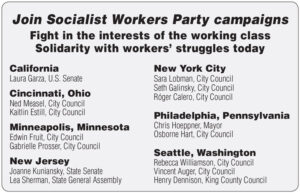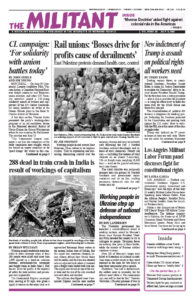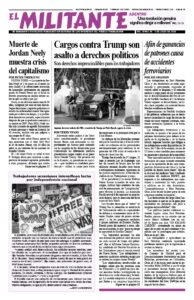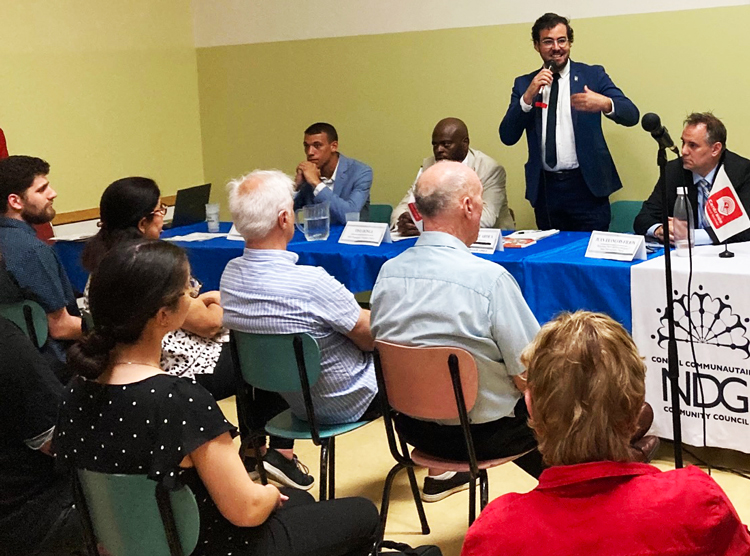MONTREAL — On June 16 Communist League candidate Félix Vincent Ardea, a Canadian National Railway freight conductor and Teamsters union member, and other CN Teamster members joined a 150-strong solidarity march of strikers and supporters of the 330 United Steelworkers union members on strike at the Owens Illinois plant in the Point St. Charles district of Montreal.
A few days earlier, Vincent Ardea presented the party’s working-class program at an all-candidates forum in the Montreal electoral district of Notre-Dame-de-Grace-Westmount where he was running for Parliament. The election was June 19.
“The Communist League campaign is not like the campaigns of the other candidates here tonight, which are based on empty promises to do ‘good things’ for voters in this constituency,” Vincent Ardea told some 70 people. The forum was sponsored by the NDG Community Council. Another 50 watched it online.
“In the context of the economic, social, and moral crisis of capitalism, our campaign aims to help strengthen the union movement and the struggles of workers and farmers,” he said. The council asked the candidates to discuss their views on the worsening housing crisis reflected in rising rents, the lack of government-built social housing and rising mortgage rates. Vincent Ardea was the only one to offer a working-class perspective.
“The unions should demand that Ottawa fund and carry out a massive public works program to create jobs at union-scale pay to build and run housing, schools, hospitals, roads, mass public transportation and other things vital for working people,” he said.
He explained that as long as land and shelter are commodities to be bought and sold on the market within the capitalist profit system, the housing crisis for workers and farmers will never be solved. “It will take a social revolution to make adequate, affordable shelter a fundamental right.”
Vincent Ardea said working people and the unions need to oppose Ottawa and Quebec City’s attacks on basic democratic rights, pointing to the federal government’s use of the Emergencies Act last year to crush the truckers’ demonstration in Ottawa. And the recent adoption of Bill C-13, the revised Official Languages Act, which restricts the right to use English and other languages other than French in Quebec.
“Several weeks ago, the Quebec government banned the use of a government-funded convention center in Quebec City by a right-wing anti-abortion religious organization on the grounds that the organization’s views do not reflect ‘the fundamental principles’ of the province,” said Vincent Ardea. “This kind of state censorship threatens the right of free expression and is a danger to the democratic rights of working people.”
Discussions in Rouyn-Noranda
There is an ongoing debate in Rouyn-Noranda — a seven-hour drive north of Montreal — on how to limit arsenic and other toxic emissions from the Horne copper foundry and at the same time defend the jobs and living conditions of plant workers and their families. Along with other questions facing workers, this issue was front and center in door-to-door discussions Vincent Ardea and campaign supporter Joe Young, a member of the Bakery, Confectionery, Tobacco Workers and Grain Millers union, had with working people there.
“There must be solutions so that there is less pollution from the smelter,” said bank worker Suzie Bertrand. “If there aren’t they should just close it.”
“The solutions need to come from working people,” said Vincent Ardea. “In East Palestine, Ohio, where there recently was a train derailment spilling extremely toxic chemicals, the rail workers as well as those who live in the area have shown the possibility to unite, organize and fight for the health of all.”
“They always say that the smelter must close,” said a Horne foundry worker who asked that his name not be used. “There are improvements to be made, but we don’t need to close the plant. It will not be better if they move to another country where environmental norms are less strict. We don’t want to send the problem to others.”
“I agree,” said Vincent Ardea. “We shouldn’t counterpose jobs to reducing the emissions. Workers through their unions need to control production in the foundry, and work with a committee of those who live close by to eliminate dangerous emissions.”
“It’s difficult to fight against the big companies. They do everything to divide us,” said another Horne foundry worker. He described the 2002-2003 hard-fought 11-month strike at the foundry.
“We have seen a rise in workers’ struggles in the recent period, like the fight of the 55,000 education workers in Ontario last fall who defended their right to strike by defying the government’s anti-strike law,” said Vincent Ardea. “This shows what we can do when we unite against the bosses and their governments.”
Vincent Ardea discussed with Guylaine Lecomte the negative impact on families of long work shifts. She works at a convenience store with her two sons. “At work they always want more. My son works 40 hours a week and goes to school,” she said.
“To organize workers to fight against the bosses and their governments to win better working conditions, the unions need to build our own party, based on the unions, that will fight for everyone, with the goal of taking political power,” explained Vincent Ardea. “That’s not a bad idea,” said Lecomte.
The campaign wound up with a June 18 fundraising barbecue attended by 31 of Vincent Ardea’s co-workers and other campaign supporters. It raised $530 to pay for the hundreds of campaign flyers distributed to working people at their doors, on strike picket lines and other working-class struggles.


